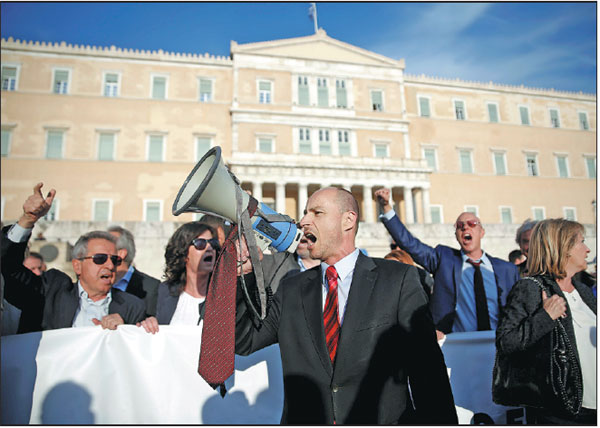Lawmakers pass painful reforms for fiscal targets
EU finance ministers to discuss whether Athens has met terms of a multi-billion euro bailout
|
Protesting lawyers shout slogans during a demonstration outside the Parliament building in Athens where lawmakers discussed tax and pension reforms on Sunday. Alkis Konstantinidis / Reuters |
Greek lawmakers passed a package of unpopular pension and tax reforms on Monday that the country's government hopes will persuade official creditors to unlock bailout cash.
The approval came just hours before eurozone finance ministers were due to discuss Greece's reform progress and whether it had met the terms of a multi-billion euro bailout.
A positive signoff on the reform review will unlock more than 5 billion euros ($5.7 billion) to ease Greece's squeezed finances and make debt repayments maturing in June and July. Greece also hopes that the signoff will also launch discussions on debt relief.
"We have an important opportunity before us for the country to break this vicious cycle, and enter a virtuous cycle," Prime Minister Alexis Tsipras told lawmakers.
Earlier, thousands of demonstrators protested outside Parliament. Police used tear gas when isolated groups hurled petrol bombs in a central Athens square.
A combination of social security reform and additional taxation aims to ensure Greece will attain savings to meet an agreed 3.5 percent budget surplus target before interest payments in 2018, helping it to regain bond market access and make its debt load sustainable.
The vote was a test of the ruling coalition's cohesion, given its wafer-thin majority of three lawmakers in the 300-seat Parliament. All of the coalition's 153 lawmakers voted in favor.
Tsipras' government drew fire from the political opposition during the debate, on grounds that the pension cuts and tax hikes will prove recessionary, dealing another blow to a population fatigued by years of austerity.
"Mr Prime Minister, you promised hope and turned it into despair," said Fofi Gennimata, leader of the opposition PASOK socialists.
'Solidarity tax'
Tsipras' government was re-elected in September on promises to ease the pain of austerity for the poor and protect pensions after he was forced to sign up to a new bailout in July to keep the country in the eurozone.
"The measures will be a tombstone for growth prospects," said Kyriakos Mitsotakis, leader of the conservative New Democracy party which leads in opinion polls.
The package aims to generate savings equivalent to 3 percent of GDP, raising income tax for high earners and lowering tax-free thresholds.
It increases a so-called 'solidarity tax' and introduces a national pension of 384 euros a month after 20 years of work, phases out a benefit for poor pensioners and recalculates pensions.
More taxes could be in the offing, newspapers reported on Monday. Greece plans to increase its value added tax, introduce additional taxes on fuel and tobacco, hotel overnight stays and Internet use, the reports said.
Finance Minister Euclid Tsakalotos defended the reforms, saying lower pension replacement rates would affect the rich and not the poor.
"Our word is a contract. We have done what we promised and hence the IMF and Germany must provide a solution that is feasible, a solution for the debt that will open a clear horizon for investors," Tsakalotos told lawmakers.

























